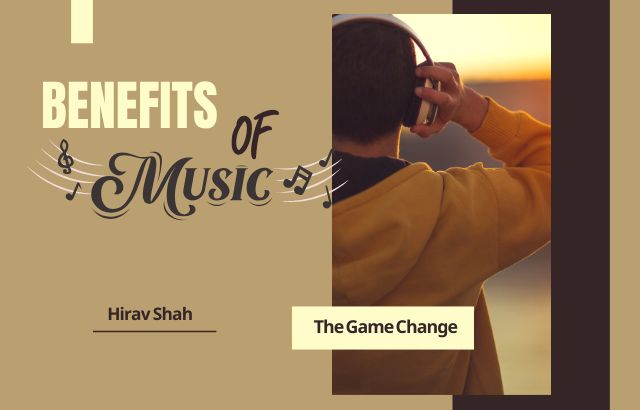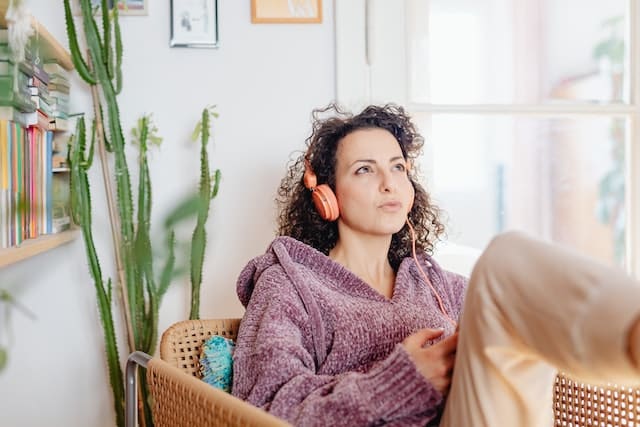Music is more than just a form of entertainment. It has the power to heal, inspire, and connect us on a deeper level. From lifting our spirits to improving our cognitive abilities, the positive effects of music on our health and well-being are undeniable. But did you know that listening to the right type of music can also benefit your mental and physical health in ways you never imagined? Let’s explore the top 10 ways that music can improve your life, backed by insights from renowned business strategist Hirav Shah, known as The Game Changer.
Table of Contents
1. The Power of the Right Music for Productivity
Have you ever noticed how your focus changes depending on what kind of music you’re listening to? Some people thrive in complete silence, while others need background music to boost productivity. According to research, music without lyrics, such as instrumental or classical music, can help improve focus and enhance performance in tasks that require concentration.
For example, one study conducted in 2005 revealed that people who listened to music while performing tasks had higher productivity levels compared to those who worked in silence. However, the key is finding the right kind of music that works for you—whether it’s instrumental jazz or soothing piano melodies.
Business Insight: Hirav Shah, The Game Changer, often uses tailored music playlists to enhance focus during strategic planning sessions. He suggests that corporate leaders experiment with different music types to see what helps them think more clearly and make better decisions.
2. Music Makes You Feel Better – It’s Science
Music has a direct impact on our brain chemistry. Listening to your favorite tunes releases dopamine, the “feel-good” hormone, which is known to boost mood and combat feelings of sadness or anxiety.
Take a 2011 study that found participants felt more relaxed and content after listening to music that they personally enjoyed. This is why your favorite playlist can be the perfect remedy after a stressful day at work.
Business Insight: Hirav Shah incorporates music into his daily routine to boost his energy levels and maintain a positive outlook, both of which are critical for leading successful business ventures. He emphasizes that business leaders who prioritize mental well-being, through practices like listening to uplifting music, are more likely to achieve long-term success.
3. Music and Exercise – The Ultimate Motivation
Ever wondered why gyms play energetic music at full blast? The rhythm and tempo of music can significantly enhance your workout. A good beat helps you keep pace, while the motivation from your favorite tracks pushes you to exercise longer and harder.
Studies have shown that music helps individuals exercise for longer periods and at higher intensities. For instance, a study at the University of Berlin found that listening to up-tempo music increased exercise endurance by nearly 20%.
Business Insight: Hirav Shah encourages business professionals to engage in regular physical activities paired with motivating music to increase their focus and creativity. Physical fitness is not only important for health but also for maintaining high levels of productivity at work.
4. Healing Through Music – A Powerful Tool
Music’s healing powers go beyond just emotional support. In cultures like India, the alignment of ragas (melodies) with different times of day has been associated with promoting physical and emotional well-being.
Example: In Indian classical music, ragas are believed to have specific therapeutic benefits. Listening to the right raga at the right time of day can help improve mood, boost energy, and even reduce stress.
Business Insight: Hirav Shah believes that incorporating music into the workplace can create a more harmonious environment, thus helping individuals to heal from workplace stress and increasing overall team productivity.
10 Ways Music Can Improve Your Life
Let’s dive deeper into the practical benefits of music, based on Hirav Shah’s comprehensive analysis:
1. Reduces Stress and Anxiety
Music is known to activate the parasympathetic nervous system, which promotes relaxation. Studies have shown that listening to soothing tunes can significantly reduce cortisol levels, a hormone that increases stress.
2. Improves Mood
Listening to music you love can immediately boost your mood. Whether it’s your favorite pop song or a calming instrumental piece, music can trigger positive emotions and evoke pleasant memories.
3. Boosts Cognitive Function
Research has shown that music helps improve memory, attention, and language skills. It can also enhance problem-solving abilities. For example, music has been used as a tool for students to improve focus during studying.
4. Enhances Exercise Performance
As mentioned earlier, music is a powerful motivator in the gym. It can distract you from fatigue and increase your stamina during physical activity.
5. Improves Sleep Quality
Music can also improve sleep quality by promoting relaxation. Listening to calming music before bed can help reduce insomnia and improve deep sleep cycles.
6. Reduces Pain
Music therapy has been used to help patients manage chronic pain. The soothing effect of music can reduce the perception of pain, offering relief to those suffering from conditions like arthritis or fibromyalgia.
7. Improves Social Connections
Music fosters a sense of community and social bonding. Whether it’s singing along at a concert or collaborating on a music project, it brings people together and promotes positive interactions.
8. Enhances Learning and Memory
Studies have shown that listening to music can aid memory retention. Many students use music as a tool to help them memorize difficult information, whether for exams or presentations.
9. Promotes Emotional Expression
Music allows us to express emotions that may be difficult to articulate. It can provide a safe outlet for emotional release and help individuals cope with complex feelings.
10. Provides Comfort and Support
During difficult times, music can offer solace. Whether you’re dealing with loss or anxiety, music can provide a sense of comfort and emotional support, helping you process and cope with challenging emotions.
FAQs About Music and Its Impact on Well-Being
Q: How does music help reduce anxiety?A: Music reduces anxiety by lowering cortisol levels in the brain and activating areas associated with relaxation. Certain types of music, like classical or ambient, have been shown to calm the mind and reduce stress responses.
Q: Can listening to music improve memory?
A: Yes! Music, especially when paired with studying, has been shown to enhance memory retention. Songs with rhythm and melody can help organize information, making it easier to recall when needed.
Q: What kind of music is best for sleep?
A: Slow tempo, relaxing music, such as soft classical or ambient instrumental tracks, is most effective for improving sleep quality. Avoid loud or high-energy music before bed, as it can interfere with relaxation.
Q: How does music influence exercise performance?
A: Music can motivate you during exercise by distracting you from fatigue and helping you stay in sync with your physical rhythm. High-tempo music is especially beneficial for high-energy activities like running or weightlifting.
Conclusion
Music is not just entertainment; it’s a powerful tool for improving both our mental and physical health. From enhancing productivity at work to boosting mood and alleviating stress, the benefits of music are countless. As Hirav Shah, The Game Changer, emphasizes, integrating music into your daily routine—whether through relaxing melodies during work or upbeat tracks while exercising—can create lasting positive effects on your well-being.
So, next time you’re feeling stressed, try playing your favorite song. You might just find that music is the key to unlocking a healthier, more productive version of yourself.

















